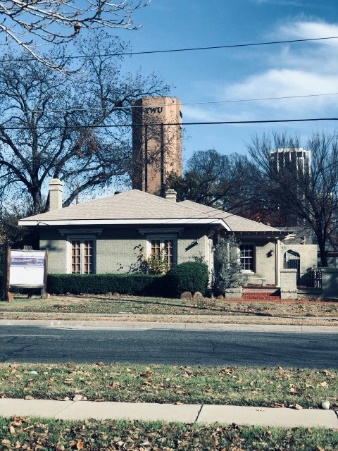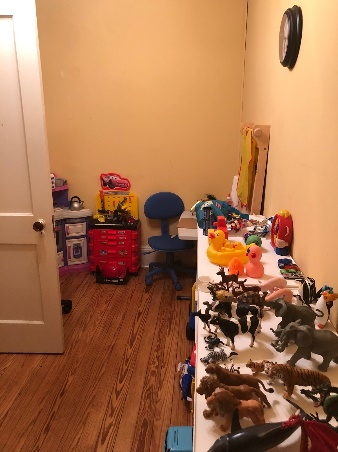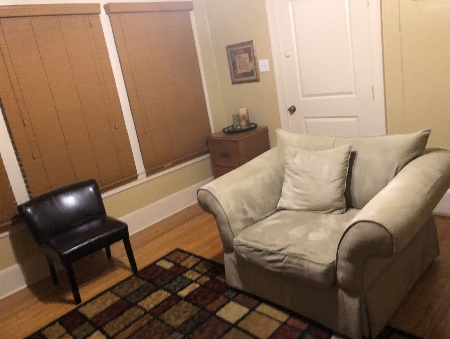Stop the Stigma: Addressing the Mental Health Needs of Denton
Guest blog by Jordan AbuAljazer, Rebecca Hambery, George Martinez
Formed in 2015, Stop the Stigma is a nonprofit organization with the mission of eradicating the stigma placed by society on mental health. As Vice President and Director Kade Anderson explained, Stop the Stigma is able to reach this mission by offering public mental health education and affordable professional counseling for residents of Denton county. The nationally recognized non-profit organization has completed more than 1,000 counseling sessions since its inception with the support of volunteers and donors.
Stop the Stigma was co-founded by Anderson after a fellow volunteer at Texas Frightmare Weekend, an annual horror-focused event hosted in Dallas, died by suicide at the end of 2015. Having just finished his master’s degree in counseling, Anderson worked with his clinic director and the owners of Texas Frightmare Weekend to create something to address the apparent gap in mental health care in the Denton community.
“We were just like ‘Ok, let’s find something to put our efforts towards.’” said Anderson, one of the original four involved along with Heather Smith, Lloyd Cryer, and Sue Cryer. Smith is the President of Stop the Stigma and the clinic director and owner of Reflections Counseling, Stop the Stigma’s office and counseling center.
The role of Stop the Stigma is to address a gap in Denton county’s ability to provide mental health care. With Texas in the bottom 10 states in regards to mental healthcare access and Denton spending less than .5% of the county’s budget on mental health care, governmental organizations are overworked and unable to address the full need of Denton’s citizens. Stop the Stigma is currently working to bridge that gap by offering mental health services and education that is not tied to limited government funding.
As Anderson explained, “There was MHMR [Texas Department of State Health Services], there were Universities’ clinics, there were those things, but as far as an organization that exists within the community and not part of a governmental organization to provide discounted counseling services, there was nothing.”
Though the gap may be clear, Stop the Stigma’s work to address it is by no means simple. Public education on mental health requires event hosting and a well-planned method to educate attendees who may not be familiar with the importance of mental health.
On the process of mental health education, Anderson clarified “it usually just starts with ‘Hey, have you heard about Stop the Stigma?’ It’s a very non-committal question.”
This non-committal attitude allows for a factual but compassionate response to educate the public, especially those with a stigma toward mental illness. He explained “what we’re working on is providing a factual basis to educate people on the nature of mental health...to help people understand the reality of what’s going on around us.” Beginning with a casual interaction is vital in communicating the importance of mental health and stopping the stigma.
In addition to hosting events to educate the public, Stop the Stigma focuses on hosting affordable and licensed counseling for Denton county residents who may otherwise not be able to receive it. Stop the Stigma works with counselors who agree to offer discounted services, and these sessions are hosted at the Reflections Counseling of Denton building near the Texas Woman’s University and University of North Texas campuses. These counseling sessions accommodate both adults and children with special rooms made for both age groups.
Accomplishing the mission of Stop the Stigma requires its members to play many roles, something that Anderson can attest to: “My official role is Vice President, and it really entails a little of everything. I mean, I’m the one who’s here at the office doing the day-to-day operations. I work with our counselors. I help them with scheduling. I’m the one who fields all the phone calls and all the emails. I do most of our marketing and outreach.”
This level of work is not unusual for members of Stop the Stigma. The gap of mental health care that is left in Denton asks for a large community effort, and this gap is not unique to the county. In fact, one of Stop the Stigma’s main goals for the future is to expand beyond Denton and address the mental healthcare needs of other communities as well.
“My personal views are that we can’t necessarily wipe out mental illness with the current state of the medical field in the U.S. and of the world,” Anderson explained, “So by expanding the scope, by healing the system one little ripple at a time, more and more people of more and more demographics are going to continue to say ‘This is me, and yes, I also struggle.’”
The work of Stop the Stigma to both provide public mental health education and affordable mental healthcare creates a place of compassionate and professional support for residents of the Denton community, and with future goals to host wider events and expand beyond the county, many others can look forward to the help offered by the organization. To support or learn more about Stop the Stigma, information can be found on the nonprofit’s website and Facebook page.
Photo 1 & 2 - Specialized child and adult therapy rooms used by Stop the Stigma.
Photo 3 - Reflections Counseling of Denton



